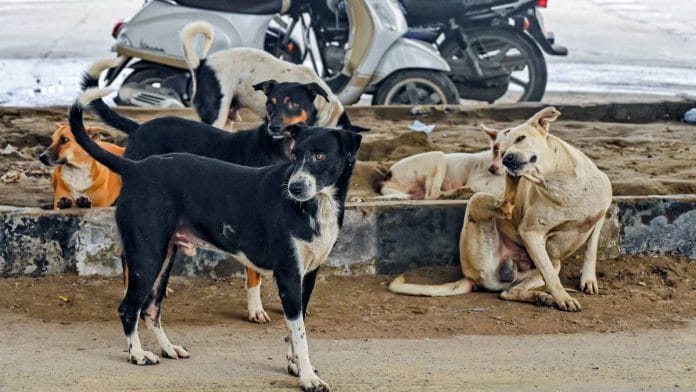New Delhi: Doctors and veterinarians across India have written to the Chief Justice of India, warning against the outbreak of zoonotic diseases in shelters for stray dogs following the 11 August Supreme Court order for capturing dogs on the streets of Delhi-NCR and confining them to shelters.
One such doctor, Arti Maria, Dean of RML Hospital in Delhi, shared her concerns on Instagram.
“These overcrowded shelters become hotspots of zoonosis, and confining a large number of dogs in closed spaces weakens their immunity,” Dr Maria said in her post of 18 August. “The diseases from these dogs could affect humans, families, and especially the workers in these shelters.”
More than 10 other letters and testimonials from doctors, accessed by ThePrint, have similarly laid out the health challenges of stray dog shelters, both for animals and humans.
According to a letter dated 18 August by Dr Rajeena Shahin, a physician, the removal of dogs from Delhi’s streets could result in both the outbreak of zoonotic diseases in shelters, as well as an “exacerbated rabies risk”.
The letter cautioned against the threat of leptospirosis and brucellosis in the shelters, two bacteria-borne diseases that can be transmitted from animals to humans and have previously caused outbreaks in Kerala and even in the US, notably in South Carolina in 2023.
“The very act of removing dogs from their home territories is contrary to scientific best practices in rabies control,” reads her letter. “It could lead to the vacuum effect … empty spaces are quickly recolonised by unvaccinated and unsterilised dogs from nearby areas.”
Other letters, such as those by Dr Neelima Seth, an eye surgeon, Ashima Nath, a consulting homeopath, and Dr Shivendra Pratap Singh, a consulting veterinarian, also point out the same concerns of zoonotic diseases and the vacuum effect when dogs are removed from their original territories.
All the letters call for the Supreme Court to stay its 11 August directive and instead undertake other measures, such as vaccination, proper waste disposal and enforcement of Animal Birth Control Rules of 2023, to address the stray dog problem.
Since the SC order on strays, a number of NGOs, citizen groups, and other sections of society have broken out in protests, terming it cruel.
On 14 August, the ROH-Indies Research Project at the University of Edinburgh also released a statement citing research that contradicts the desired public health outcomes of the SC order.
“Street dog elimination, whether through removal or culling, may seem like a quick fix, but evidence shows that it is counterproductive from a public health perspective,” reads the statement.
Pointing to India’s record in reducing human rabies cases from 247 in 2005 to 24 in 2022, the statement urged measures like animal vaccination drives and access to rabies PEP (post-exposure prophylaxis) for bite victims. It too said that removing street dogs altogether might not reduce but rather increase the risk of rabies.
According to the statement, an ROH Indies study showed that 82% of human-street dog interactions observed in India were “uneventful”, and that street dogs have evolved to “co-habit safely and harmlessly with humans”.
In case all street dogs were removed, it said, their ecological niche would be taken up by other animals carrying similar diseases, such as seagulls, foxes, coyotes, and skunks, which are “seen as even more threatening to humans”.
“In the US, the rabies virus has adapted to other animal reservoir hosts with bats, raccoons, skunks, and foxes now accounting for more than 90% of reported cases of animal rabies,” reads the statement.
(Edited by Nida Fatima Siddiqui)
Also Read: Stray dogs have the right to live. SC order can trigger a wave of animal cruelty







An excellent article based on scientific research and knowledge. Indeed, we are no strangers to the outbreak of zoonotic diseases and its large-scale destruction in this decade! A humane solution is the way forward. More importantly, civil society must thank animal activists and caregivers for their role in keeping the animals healthy, vaccinated and sterilised.
Dog lovers and dog feeders are absolute nuisances for human society. A well-knit community, their love for dogs, especially strays, far outweighs their love for fellow human beings. They can effortlessly feel the pain of a starving stray dog but are just unable to connect with the pain and fear of a young mother whose child was mauled to death by a pack of stray dogs. It is this lack of empathy and compassion for fellow human beings which makes this community an absolute nuisance.
It’s sad and disappointing that The Print has allowed it’s platform to be used and abused by these “activists” to champion the “cause” of stray dogs while deliberately and maliciously downplaying the human cost of this conflict. Quite conveniently, the blame was put on the government.